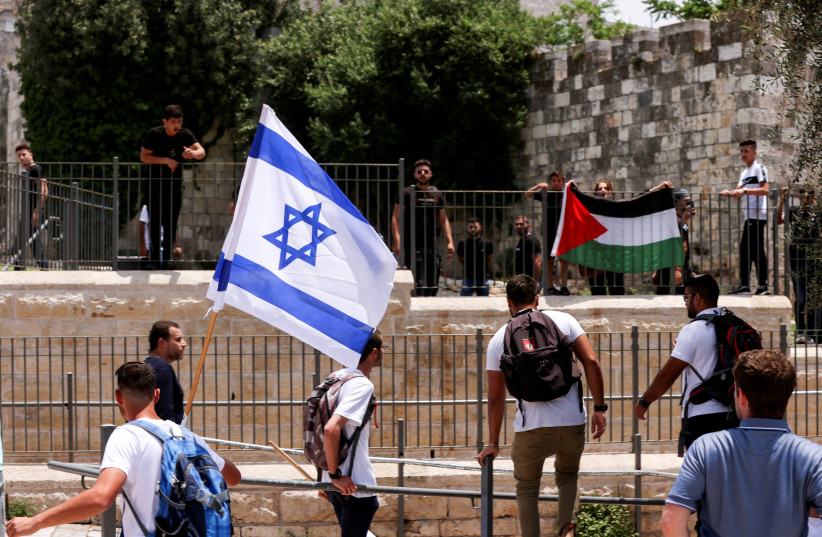These days, it seems like everyone is crazy about flags. Less than a month ago, the public display of a Palestinian flag at the funeral of famous Palestinian journalist Shireen Abu Akleh was given as an excuse for brutal Israeli police violence against the mourners. For some reason, law enforcement forces found this expression of nationalist feelings unreasonable.
Later on, raising the Palestinian flag on university campuses across the country made everyone lose their minds, leading to a new proposal for a law to ban the public display of flags of an enemy state or the Palestinian Authority in state-funded institutions. Last week, a billboard sign that included both the Israeli and the Palestinian flags together with the peaceful title “we were destined to live together was taken down to avoid hurting the public’s feelings. That is, only the part with the Palestinian flag was taken down.
But as opposed to what most columnists and celebrities state in their tweets and posts, this is not an escalation or a new red line being crossed. We’ve seen this before. Exactly 55 years ago, in June 1967, after the Six Day War and the occupation of the West Bank, Israel banned the public display of the Palestinian flag and its colors. The punishment was imprisonment, and so three Ramallah-based artists were arrested in the 1980s for using the Palestinian flag’s colors in their arts. One of the artists, Sliman Mansour, in an interview with AJ+ last year, revealed that an Israeli officer at the Ramallah police station told them that “even if you do a watermelon it will be confiscated”. So they started painting watermelons because they contained all the colors of the flag, and the popular fruit became one of the most powerful symbols in the Palestinian fight for freedom. I am now looking forward to the day that Israel decides to ban watermelons.
The watermelon story is as sad as it is ridiculous. Aside from the obvious violation of freedom of speech, Israeli society doesn’t seem to understand an even more fundamental concept: the freedom of thought. Flags can be taken off walls, but not out of people’s hearts and minds. The flag is not the issue; it is only a symbol. But it is a symbol that represents a story, a history, an identity and an aspiration.

These can never be erased, not by laws or by force.
For 74 years, there has been a powerful attempt to delete any trace of Palestinian identity, including renaming towns with Hebrew names, denying the traumas of the Nakba and perpetuating the narrative that no one lived here before 1948. But as long as there are Palestinians, the Palestinian hope will stay alive.
It’s surprising that the Jewish people – those who went through two thousand years of longing for a national home, remembering Jerusalem, and resurrecting the ancient Star of David on their national flag – think that it is possible to eliminate these exact feelings and aspirations in others. It is impossible and the Jewish story is the proof of it.
But the truth is that as much as the Palestinian flag symbolizes freedom and liberation for the Palestinians, it symbolizes fear and hatred for Israelis. They see it as an obvious threat to the Jewish state, even though it is not written anywhere on the red-green-white-and-black flag. The immediate interpretation of the Palestinian flag in the public sphere is that the existence of the Palestinians comes at the expense of Israeli Jews.
The premise is that this is a zero-sum game and only one people can win it, but there is no bigger mistake than this. My existence does not come at the expense of my neighbor’s, and his existence does not threaten mine. We were really destined to live in this land together, with or without flags, and eliminating this idea from the public discourse does not make it less true. It does not make the occupation go away. It does not make the Palestinians go away.
We have no other choice. We all have traumas and fears to deal with, and sweeping them under the rug is never a good solution. We need to let them out, acknowledge them, feel the pain and let the wounds heal. Perhaps, then we can redeem ourselves and flags won’t scare us that much anymore.
The writer is a Palestinian citizen of Israel, a physician and social activist. She serves on the board of the New Israel Fund and is studying at Harvard Kennedy School for a master’s degree in public administration.
